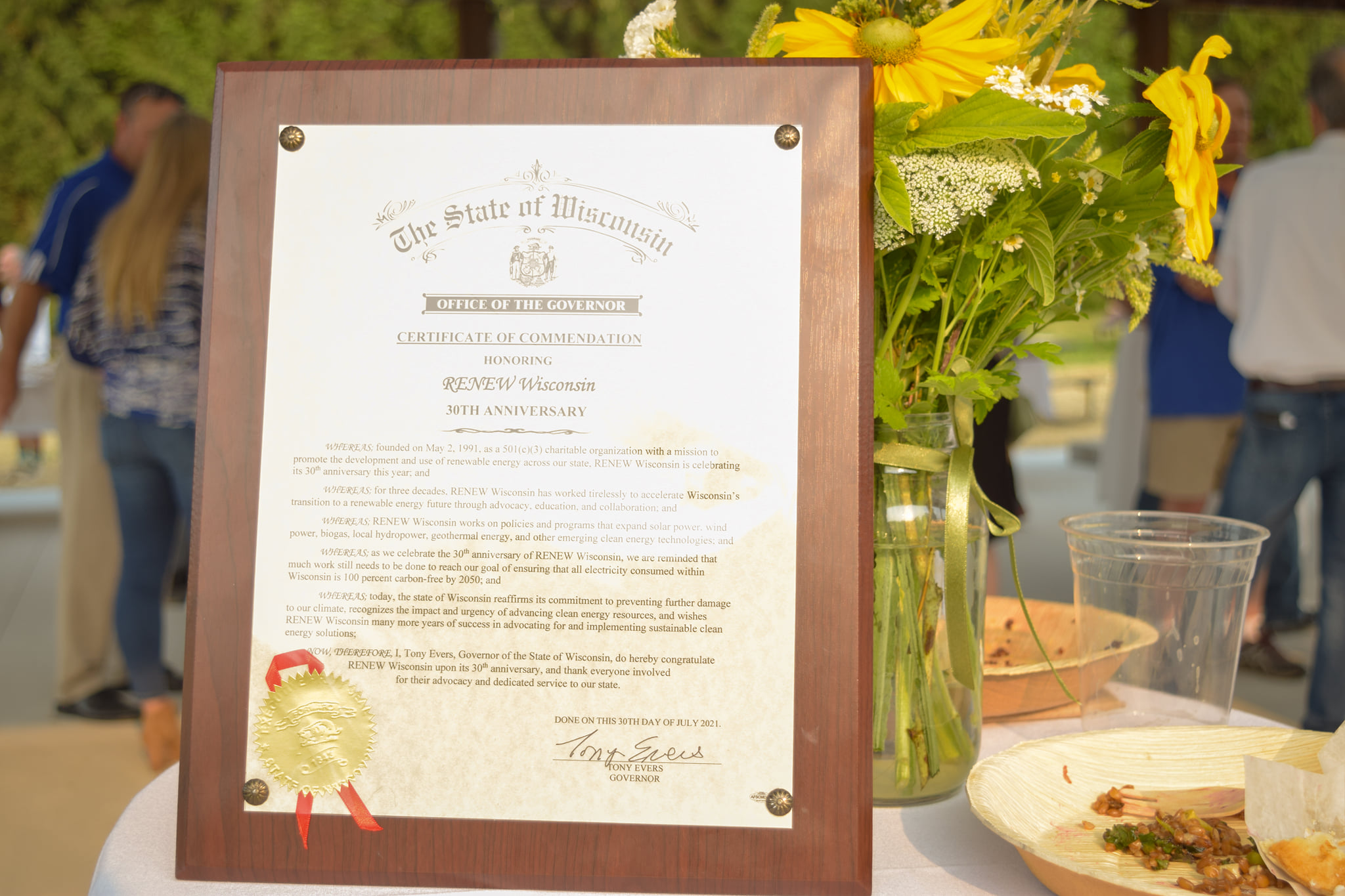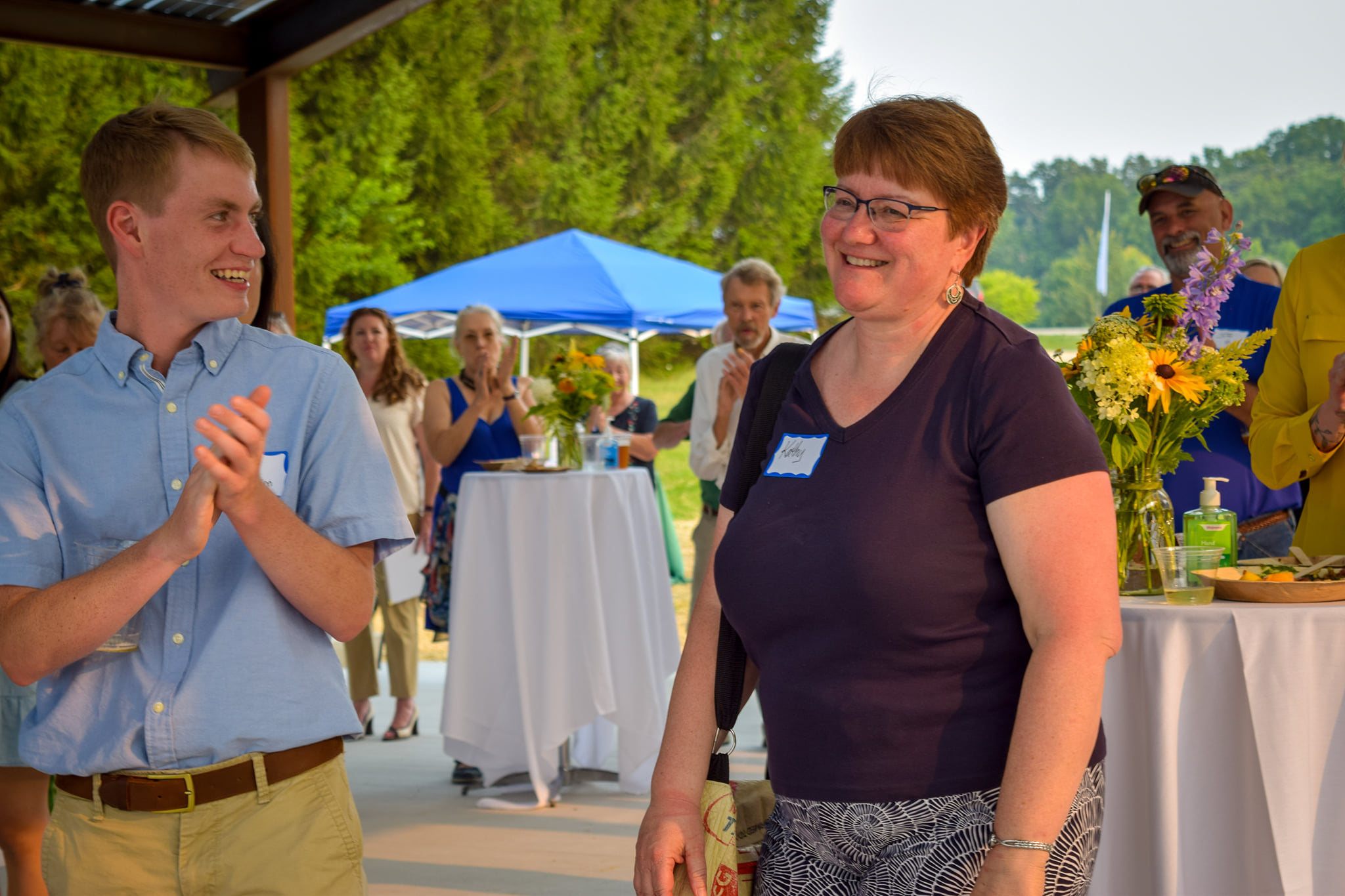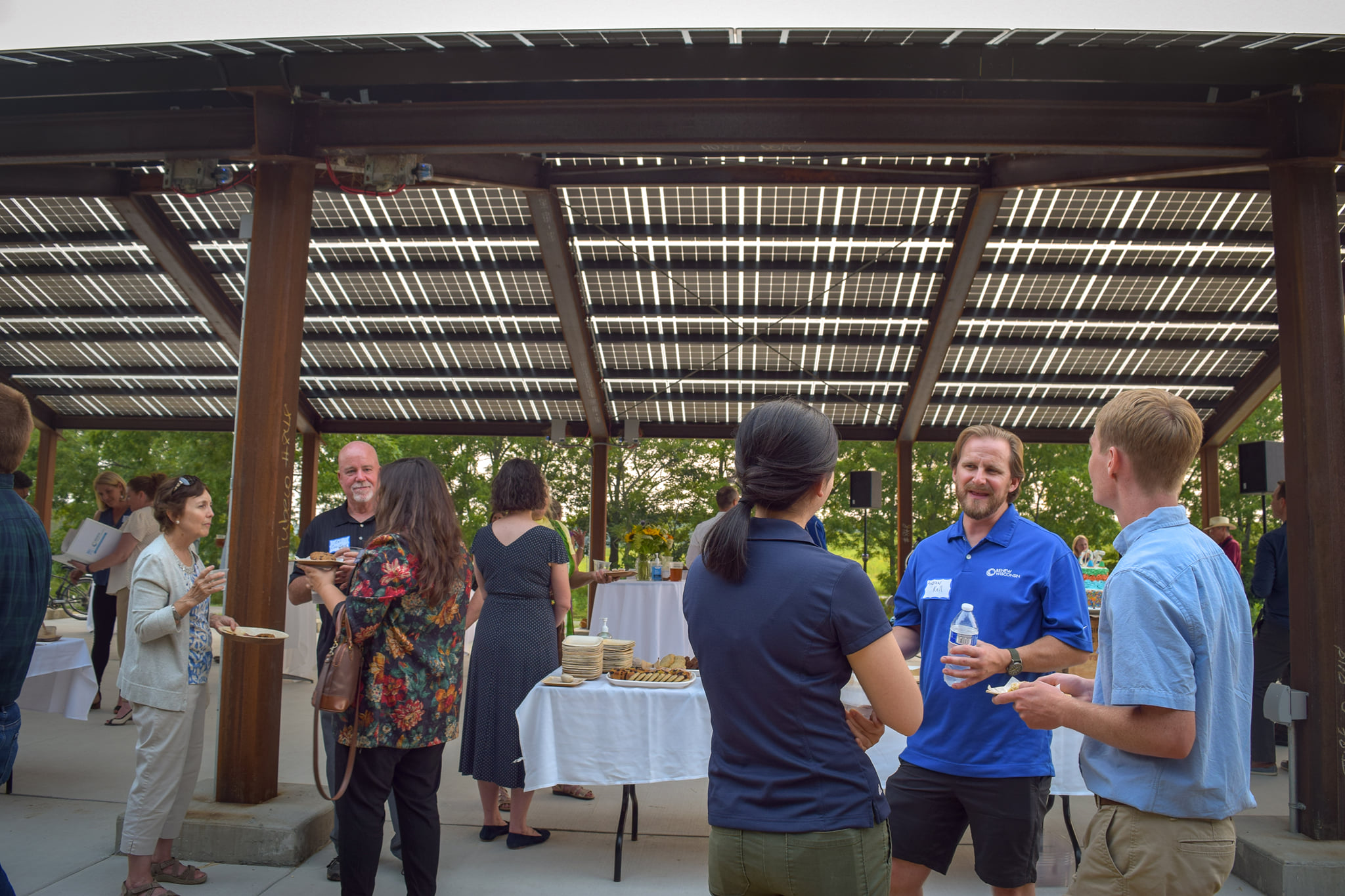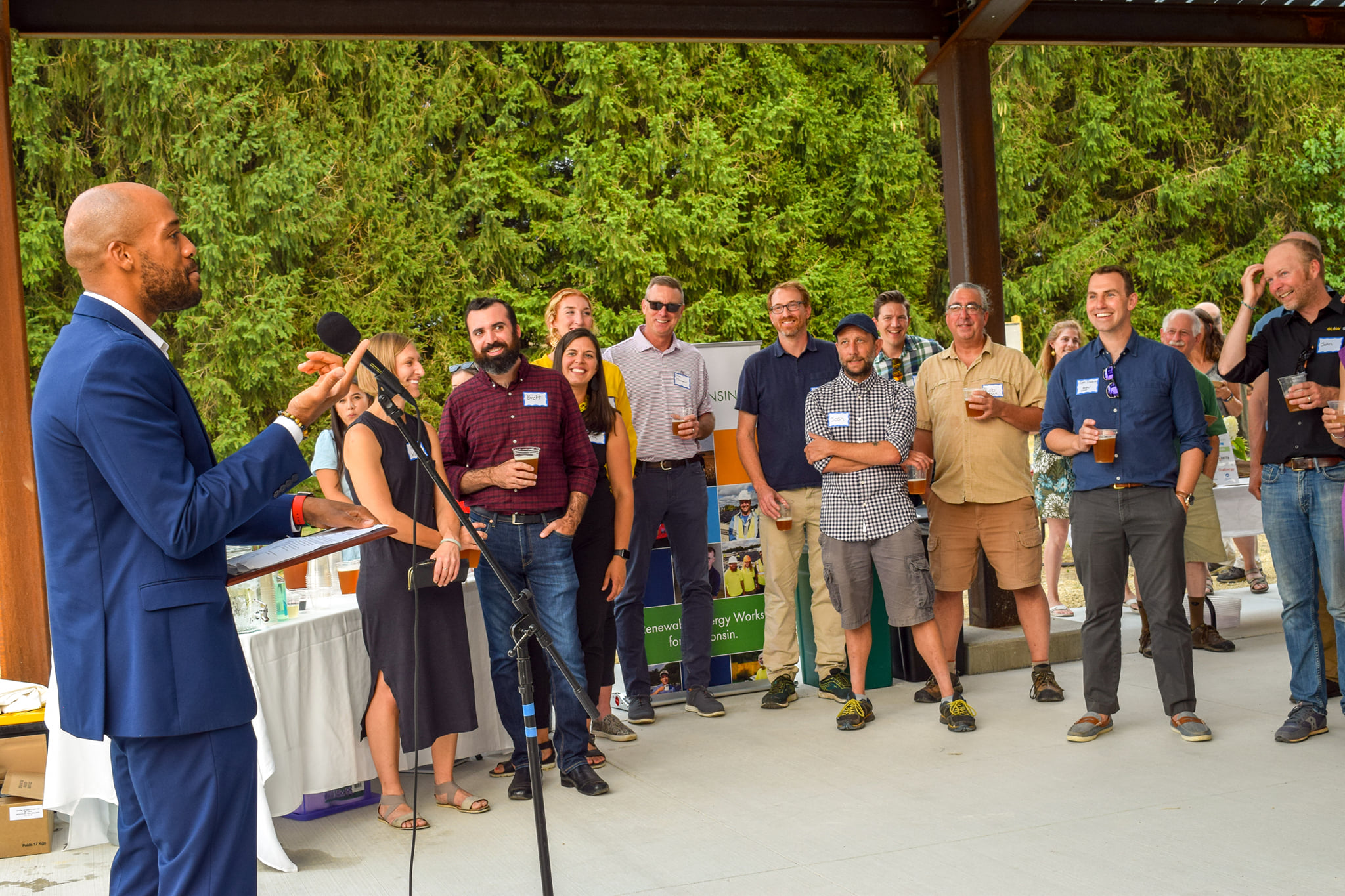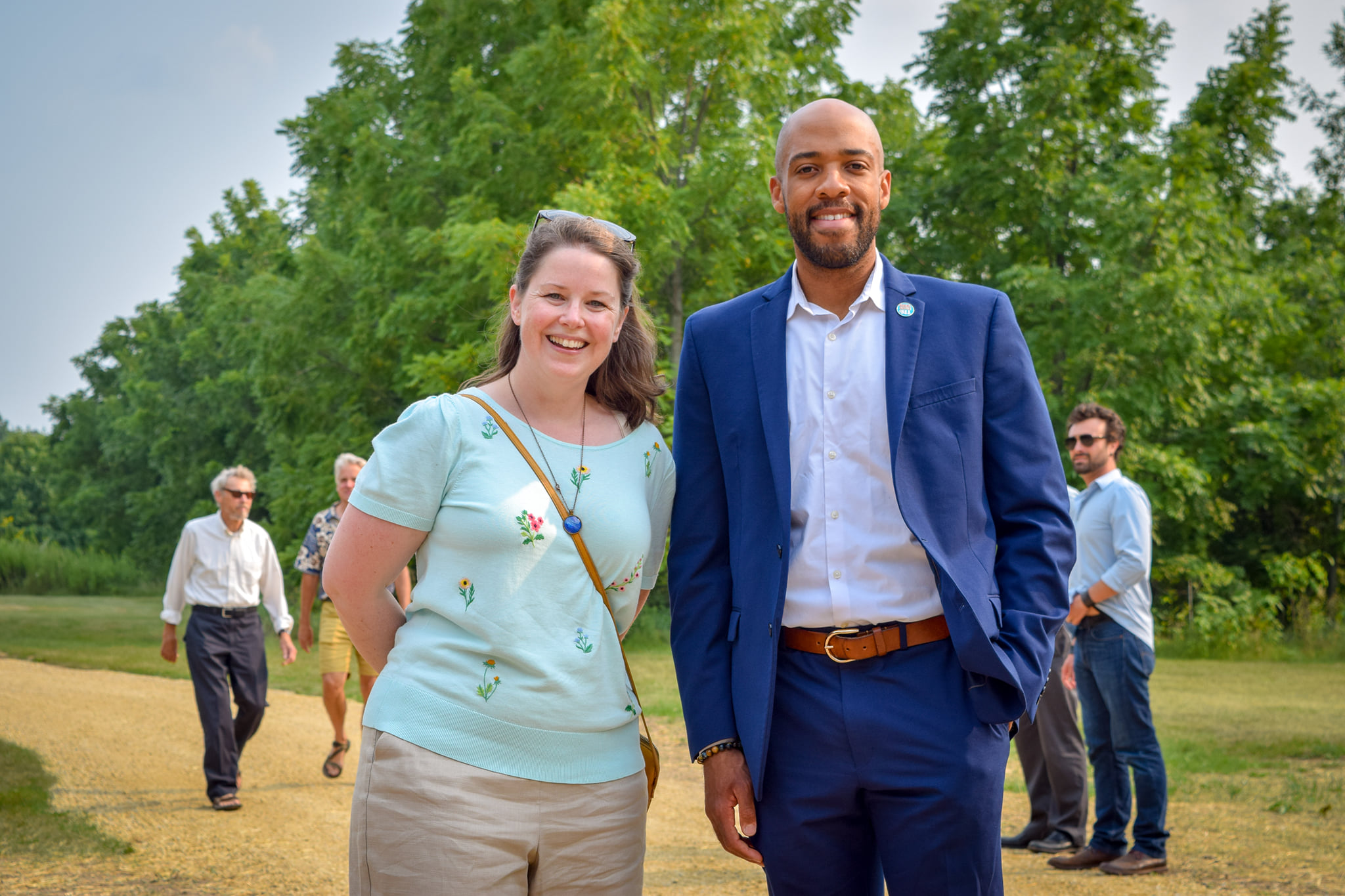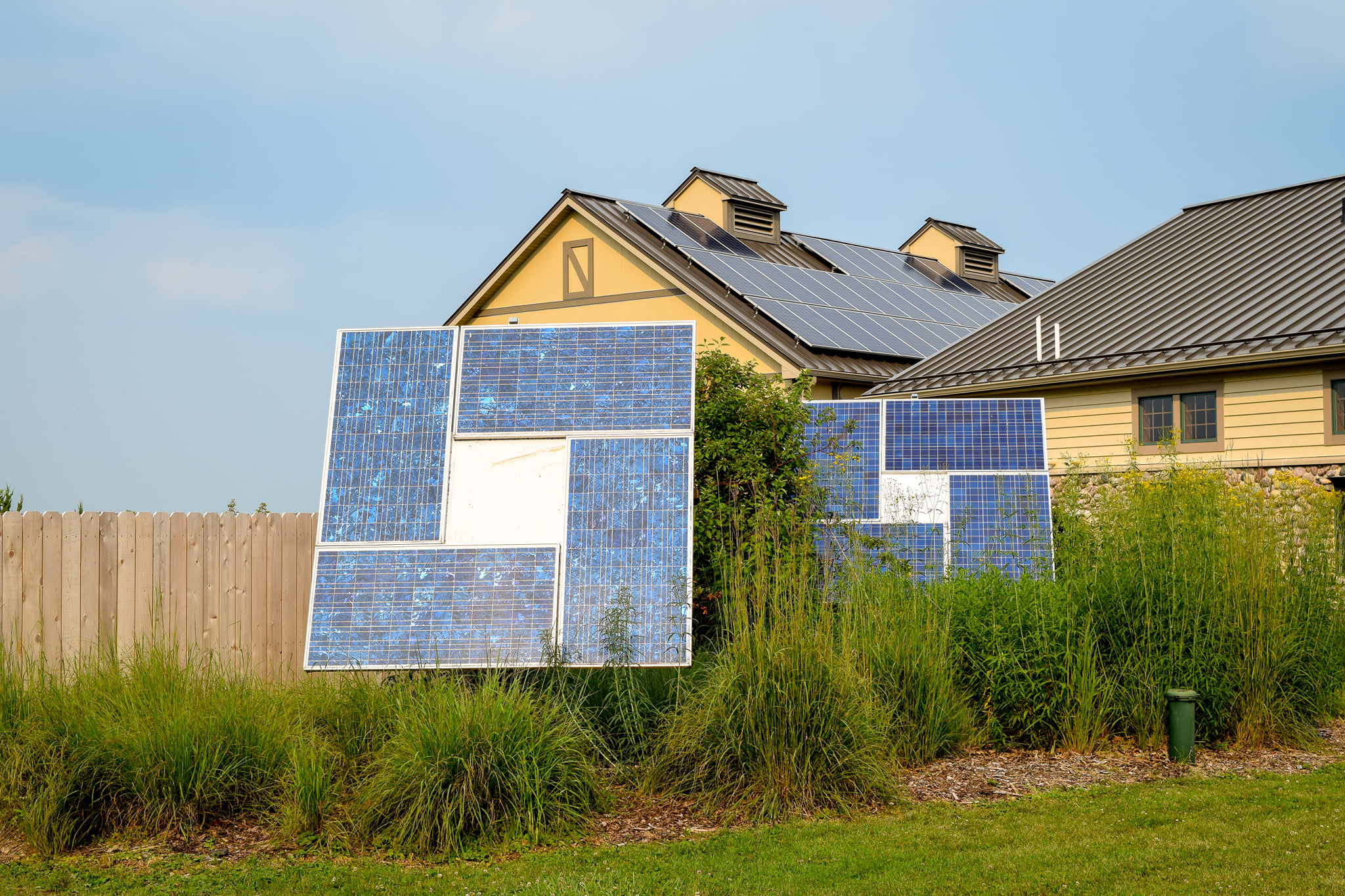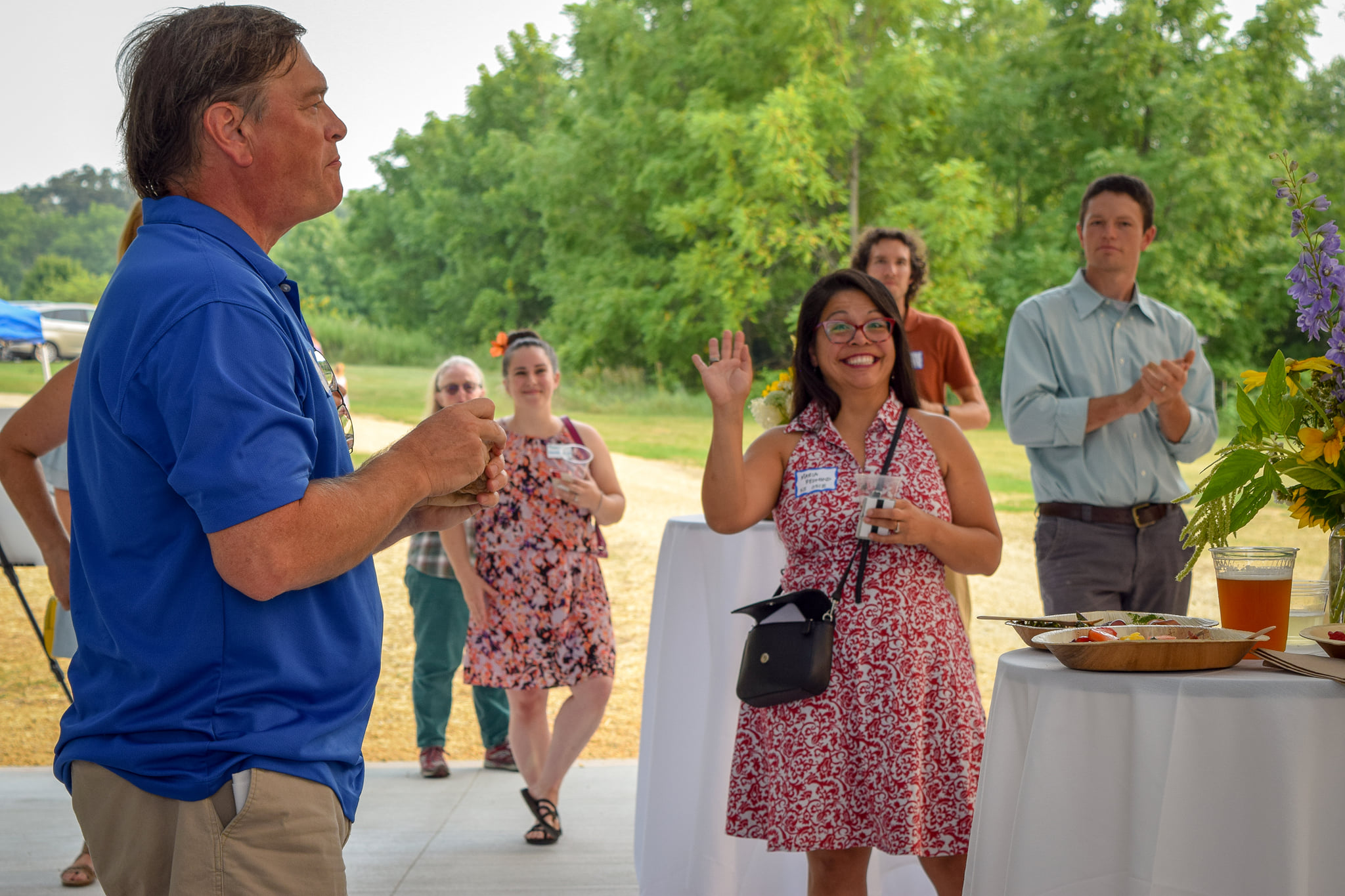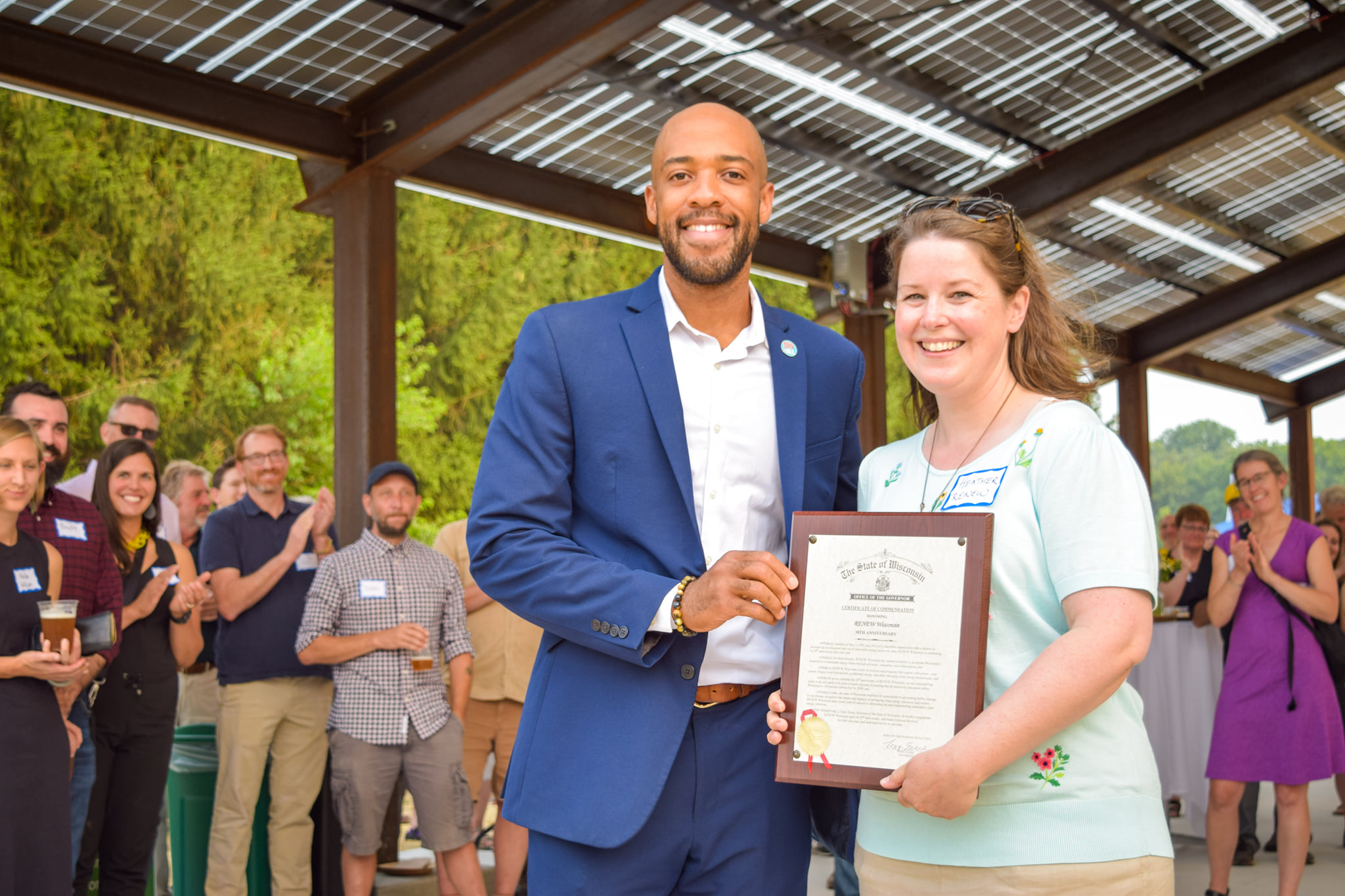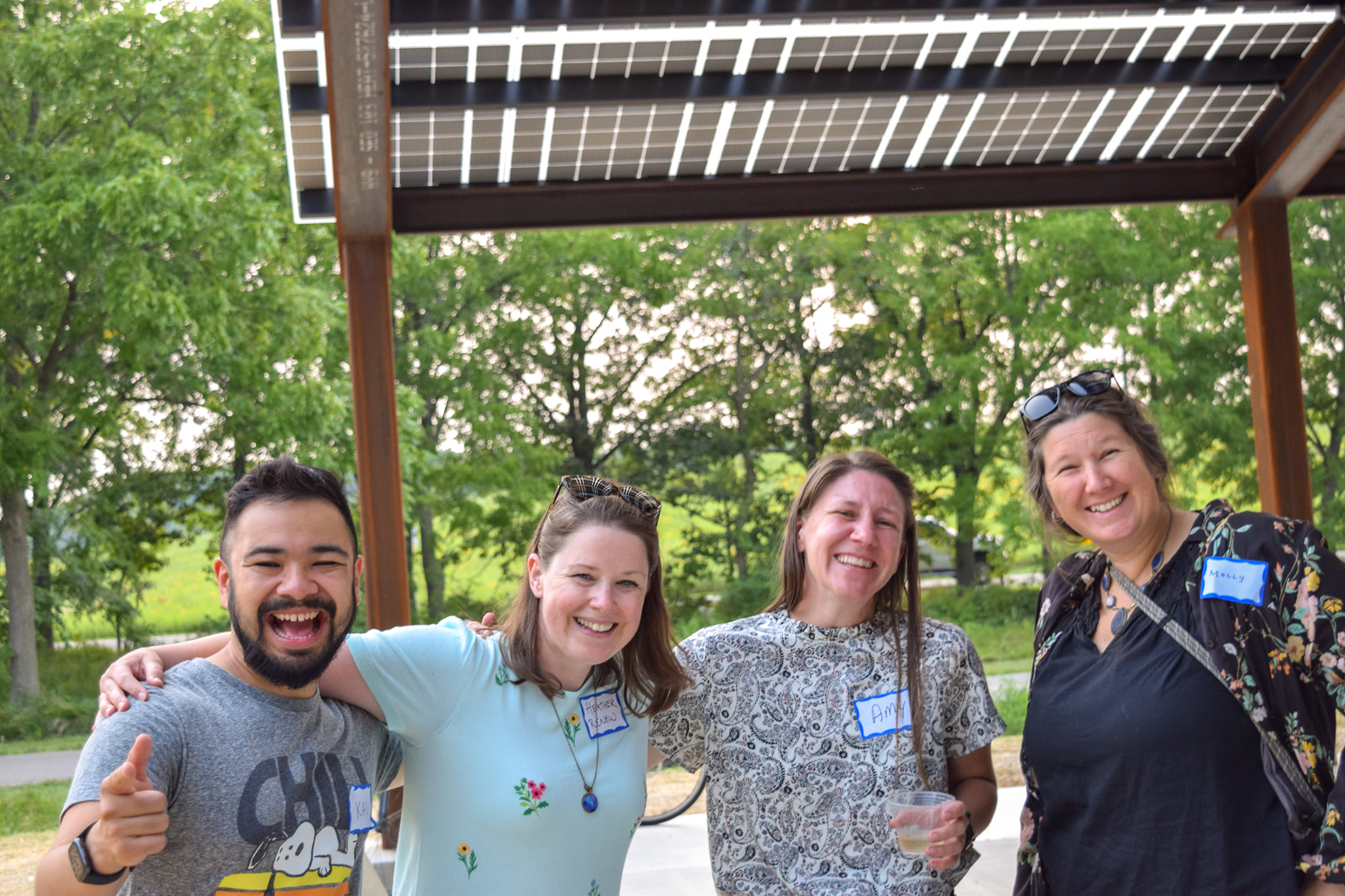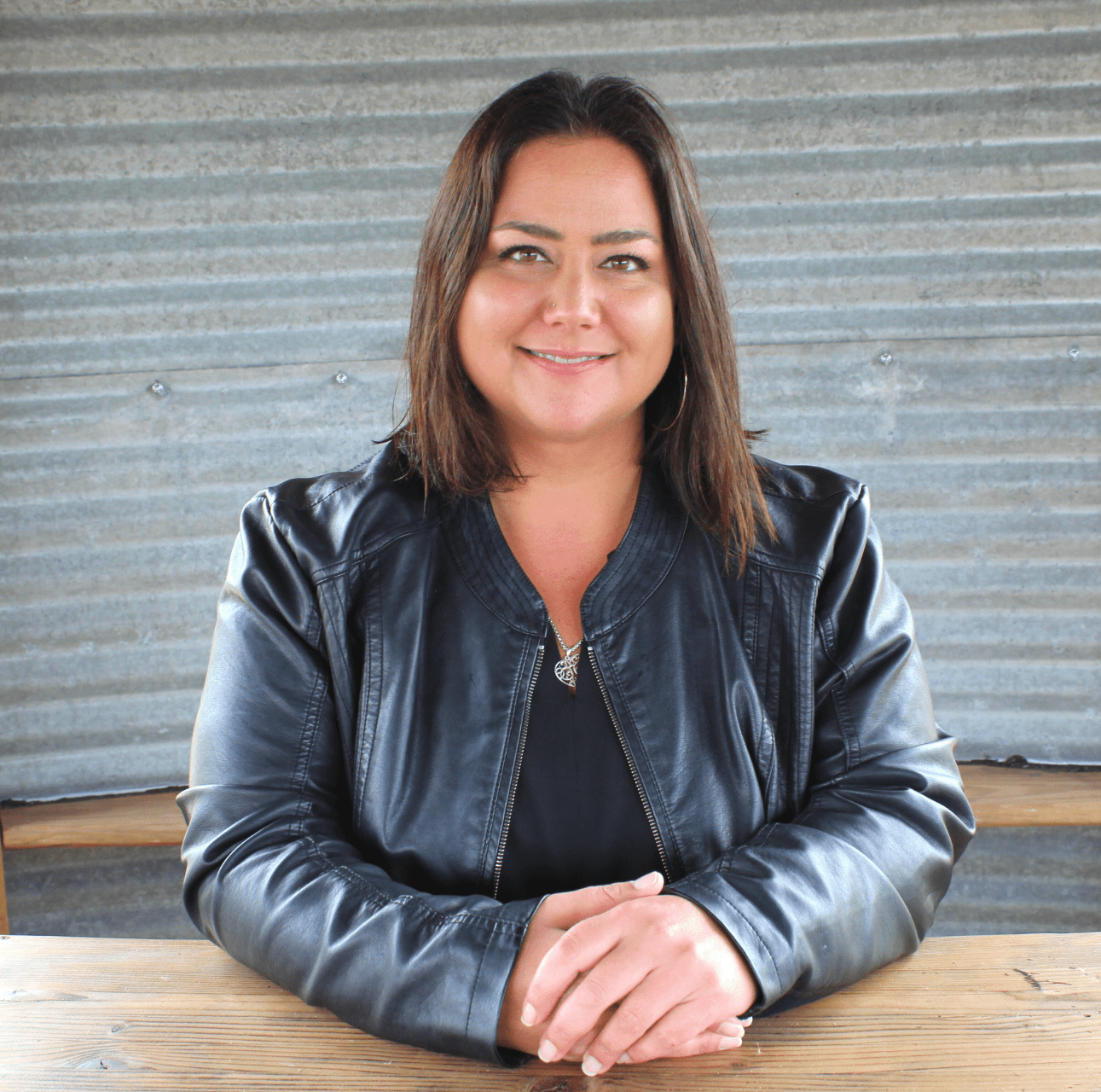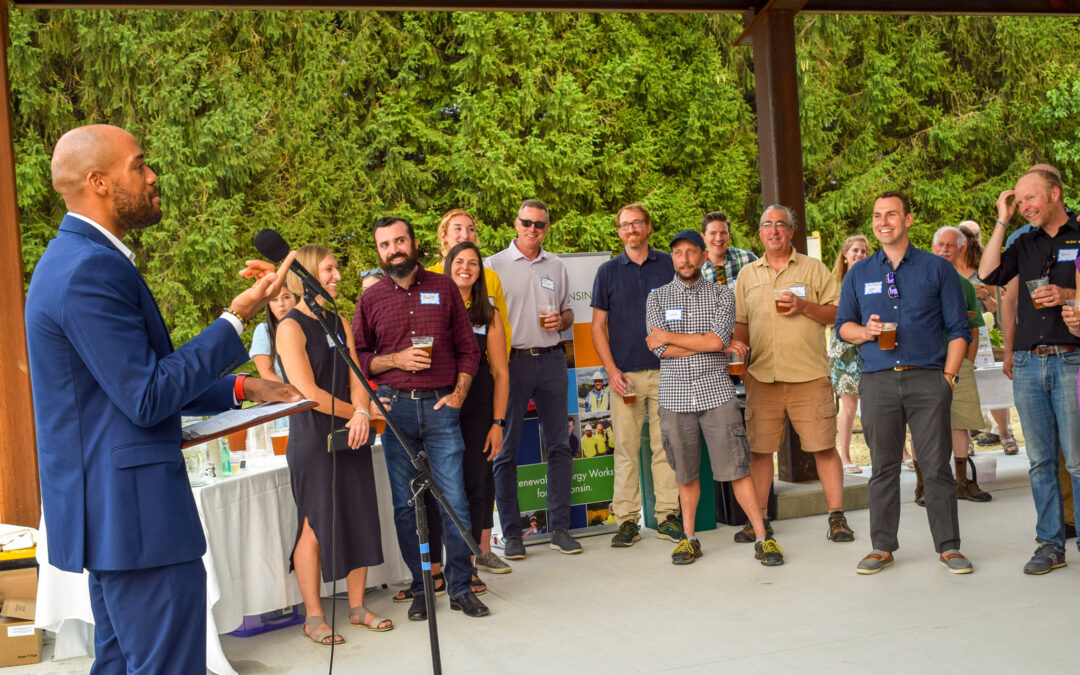
by Heather Allen | Aug 30, 2021 | Events, RENEW Wisconsin, Uncategorized
On August 3rd, 2021, RENEW Wisconsin gathered with friends and supporters under Dane County’s new solar shelter near Lussier Family Heritage Center to celebrate 30 years of advancing clean energy in Wisconsin. The weather was beautiful, and after a long period of limited opportunities for gathering in person, it was a welcome moment of connection and joy!
It was wonderful to see longtime friends and clean energy champions. Attendees enjoyed appetizers, drinks, and live music, reminisced over Wisconsin’s clean energy history, and discussed new energy policy and legislative opportunities for growth in Wisconsin.
It is a busy time for energy policy in Wisconsin! We work with lawmakers and regulators to defend renewable energy. This summer RENEW staff are engaged on the forthcoming Clean Energy Plan, the Zero Carbon Roadmap docket, interconnection rules, parallel generation rates, utility rate cases, as well as, legislation on community solar and direct sales for electric vehicles. From distributed solar to energy storage we are expanding the renewable energy market in Wisconsin.
Since 1991, our vision has not changed – to have clean, renewable energy powering a strong, healthy, and vibrant Wisconsin. We have made significant progress on our 30-year mission to lead and accelerate the transformation of Wisconsin’s renewable energy future through advocacy, education, and collaboration. You can support our urgent work with a donation today.
In advance of the event, Governor Evers issued a proclamation commending RENEW Wisconsin on 30 years of work advancing clean energy
Several special guests joined us:
- Lieutenant Governor Mandela Barnes
- Dane County Executive Joe Parisi
- Don Wichert, RENEW Wisconsin Founder and Emeritus Board Member
- Michael Vickerman, RENEW Wisconsin Policy Director
- Eric Udelhofen, RENEW Wisconsin Board of Directors
- and Stanley Minnick, Arch Electric, the evening’s emcee
Thank you to the Honey Pies for the music, Pasture and Plenty for the appetizers, Yellow Dog Farms for the flowers, Kai Brito for photos, and our sponsors Apex Clean Energy, Delta Beer Lab, eagleview, greenpenny, JDR Engineering Inc., PRC Wind, OneEnergy, and Wisconsin Conservation Voters.
This 30th anniversary would not be possible without the support of our members and partners. We thank you for joining us on this amazing journey to a stronger, healthier, more vibrant Wisconsin.
Missed our party but still want to celebrate? Sign up today for our September 26th, Ride with RENEW in Madison. Our annual bike ride will feature the Forest Edge Elementary School – the first net-zero school in Wisconsin!
by Jeremy Orr | Aug 27, 2021 | Electric Vehicles, Legislative Watchlist
Did you know Wisconsin is one of over a dozen states that currently does not allow direct sales of electric vehicles?
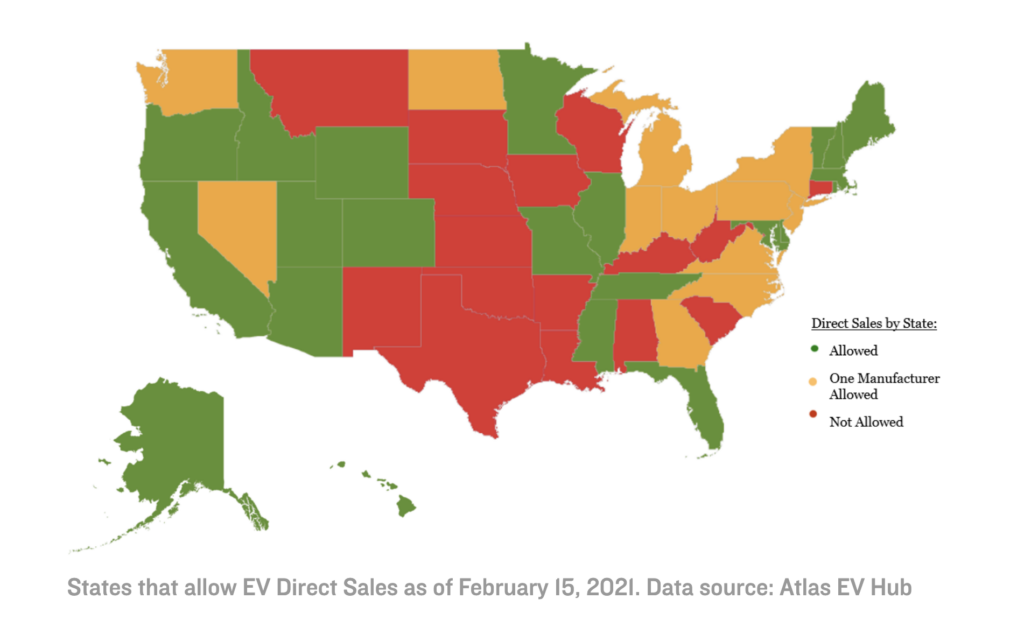
This week, I had the opportunity to provide testimony – alongside Tesla, Lucid, and other industry experts – explaining RENEW Wisconsin’s support of Senate Bill 462, which would allow direct sales of electric vehicles in Wisconsin.
This is an important and much-needed step towards electric vehicle (EV) expansion in Wisconsin, as it removes market barriers and allows consumers greater access to EVs that better suit their financial and driving needs.
This legislation also ensures Wisconsin does not get left behind in the electric vehicle marketplace. It has the potential to bring jobs to Wisconsin by opening the door for companies like Fisker, Rivian, Lucid, and Tesla to both manufacture and sell EVs directly in Wisconsin. As Henrik Fisker, CEO and Co-Founder of Fisker, Inc., recently said in Forbes: “The one sticking point for me would be that I don’t want to start producing a car in a state where I can’t sell my car direct.”
And if you’re worried about direct sales putting dealerships out of business, research shows that in states that currently allow direct sales of electric vehicles, the traditional dealership model experienced 52% sales growth and 18% employment growth (higher than the national average).
However, in states that do not currently allow direct sales, the sales and employment growth of the traditional dealership model is lower than the national average and much lower than in states that do allow it.
Senate Bill 462 is about diversifying Wisconsin’s auto industry and Wisconsin’s economy. In 2020, 45% of electric vehicles purchased by Wisconsinites were purchased in-state, and 55% were purchased out-of-state. That’s 55% in lost sales revenue due to an out-of-state electric vehicle purchase!
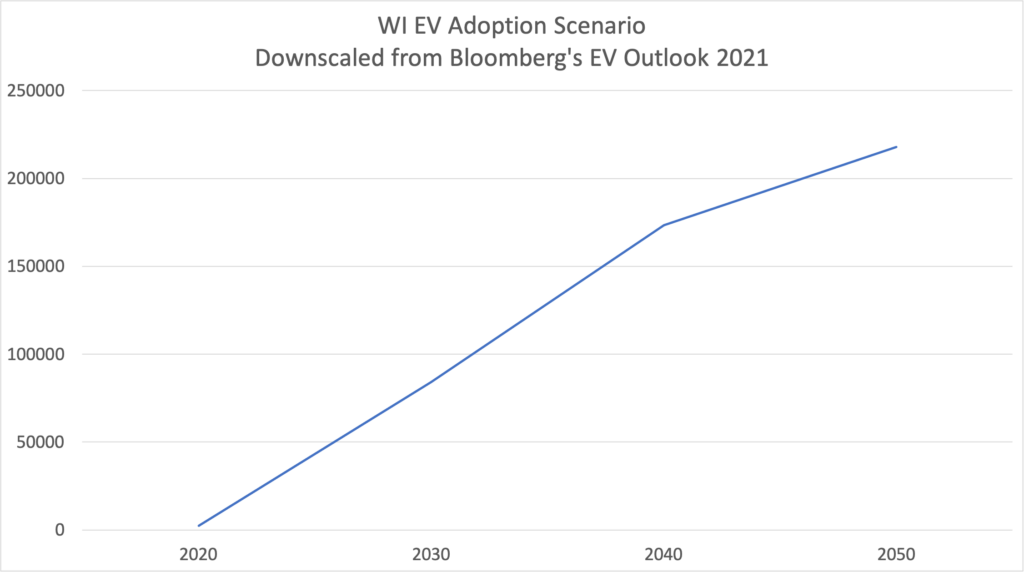
The chart illustrates the projected growth in electric vehicle adoption in Wisconsin based on Bloomberg’s EV Outlook 2021 (analysis conducted by Robin Lisowski of Slipstream Aug 2021).
Passage of this legislation would let consumers decide for themselves, how they want to shop for and purchase an electric vehicle. As Kathy Harris from NRDC puts it “Let Drivers Buy Clean Cars.”
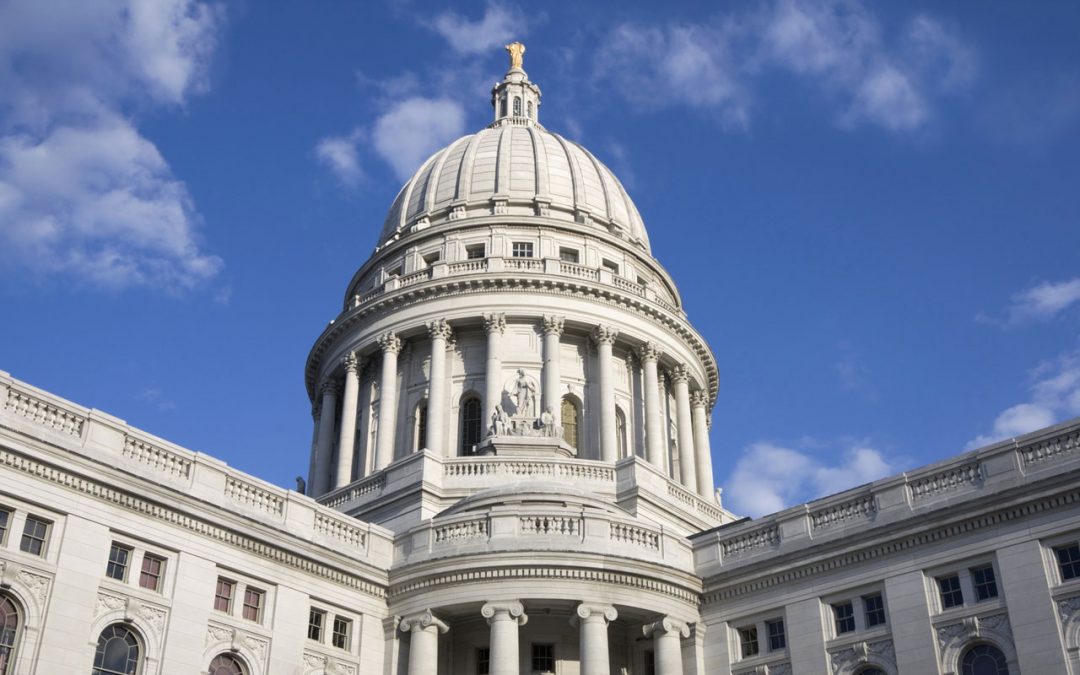
by Jim Boullion | Aug 21, 2021 | Action Alert, Advocacy, Electric Vehicles, Legislative Watchlist
The Senate Committee on Government Operations, Legal Review, and Consumer Protection scheduled a public hearing on Senate Bill 462 / Assembly Bill 439 relating to ownership, control, or operation of a motor vehicle dealership and performance of motor vehicle warranty service.
Wednesday, August 25, 2021, 10:00 AM
Room 411 South, State Capitol
Senator Dale Kooyenga (R-Brookfield) and Representative Adam Neylon (R-Pewaukee) introduced legislation to allow a direct sales business model for electric vehicles (EVs) in Wisconsin. If passed, EV manufacturers could sell and deliver their vehicles directly to consumers, either online or from a manufacturer-owned dealership, rather than Wisconsin’s current dealership model. The bill would also clarify that an EV manufacturer can provide warranty and preparation work on vehicles they manufacture in Wisconsin.
RENEW Wisconsin strongly supports this initiative and sent a letter to legislators urging their endorsement. To help pass this legislation, we encourage you to contact your legislators directly or attend the public hearing to register in favor, or even better, speak directly with the committee members.
The Kooyenga/Neylon bill is one of the keys to increasing EV availability for Wisconsin businesses and consumers and reducing transportation-related greenhouse gas emissions. The internet has completely reimagined how we buy things, opening opportunities, lowering prices, and eliminating many market barriers of the past. The bill would permit Wisconsin’s consumers greater access to EVs that better suit their financial and driving needs by allowing them to purchase directly from the manufacturer-dealership without traveling to Illinois or Minnesota.
If you have any questions or would like to report whether or not your legislators support this legislation, please contact Jim Boullion, Director of Government Affairs at jim@renewwisconsin.org or Jeremy Orr, Emerging Technologies Program Manager at jeremy@renewwisconsin.org.

by Jodi Jean Amble | Jul 29, 2021 | RENEW Wisconsin
RENEW Wisconsin’s Board of Directors plays a vital role in setting our organization’s strategic vision and direction. And all dues-supporting members of RENEW Wisconsin were recently invited to vote in the 2021 Board of Directors Election.
RENEW Wisconsin would like to thank all members who voted in our recent election and congratulate our new and incumbent board members who embark on three-year board terms. Incumbent candidates Mike Cornell (Arch Electric), Amy Seeboth-Wilson (UW-Platteville), and Jessica Niekrasz (Clean Fuel Partners) will all retain their seats. And we would like to welcome the following three newly elected board members committed to helping us advance renewable energy in Wisconsin.
Samara Hamze
Energy Educator, Wisconsin K-12 Energy Education Program (KEEP)
Samara is an energy educator at Wisconsin’s K12 Energy Education Program, where she strives to increase energy literacy in schools through educator and student engagement. Her focus is to expedite the transition of Wisconsin schools to clean energy through teacher training, student leadership development, and career exploration programming, and connecting administrators to clean energy resources.
Her journey into clean energy started when she was an unsuspecting graduate student from North Carolina who thought a summer doing research on the shores of Lake Michigan would be interesting. Little did she know she would fall in love with the entire ecosystem of the Great Lakes, make it her home, and fight to protect its natural resources. She believes one of the great greatest threats to this ecosystem is climate change and the intersecting solutions for its protection and the protection of the biosphere lie in a rapid and just transition to clean energy.
Mariah Lynne
President/Owner, Good Steward Consulting
Mariah Lynne is Owner/President of Good Steward Consulting, a public outreach and communications firm specializing in utility-scale renewable energy developments in the Midwest.
She and her team assist developers in educating host communities, stakeholders, and the general public regarding development projects. Mariah lives on the edge of a 120-turbine wind farm and spent nine years as a farm wife on a multi-generational corn/soybean farm in rural southern Minnesota. She carries with her a keen understanding of rural/agricultural life and communication preferences. Mariah and her team are working with several developers in Wisconsin, across multiple projects in development. Additionally, she was a contributor to the public outreach and communications needs during development of the 300MW Badger Hollow Solar Farm in Iowa County, Wisconsin.
She has contributed to RENEW Wisconsin’s annual conference as a sponsor, panelist, and moderator in recent years. Mariah passionately advocates for our industry and is committed to communicating the benefits of renewable energy, and the synergies between development opportunities and agriculture, to the public. To-date, she and her team are assisting in the development of over 6GW of renewable energy in our region.
Ken Walz
Renewable Energy Program Director, Madison Area Technical College
Ken is a lifelong Wisconsin resident, and his ancestors came to Milwaukee shortly after the state was established. He earned his Ph.D. from the University of Wisconsin while performing research on advanced lithium-ion batteries with Rayovac and Argonne National Laboratory. He has lived in Dane County for the last 20 years and serves as the director of the CREATE Renewable Energy Center at Madison Area Technical College. He has also worked with the USDA Forest Products Laboratory, the National Renewable Energy Laboratory, and the University of Rochester Center for Photoinduced Charge Transfer. He has served as a committee and board member for the Wisconsin Distributed Resources Collaborative, the Wisconsin Biodiesel Association, the Wisconsin Center for Environmental Education, the K-12 Energy Education Program, and the Solar Ready Vets Program.
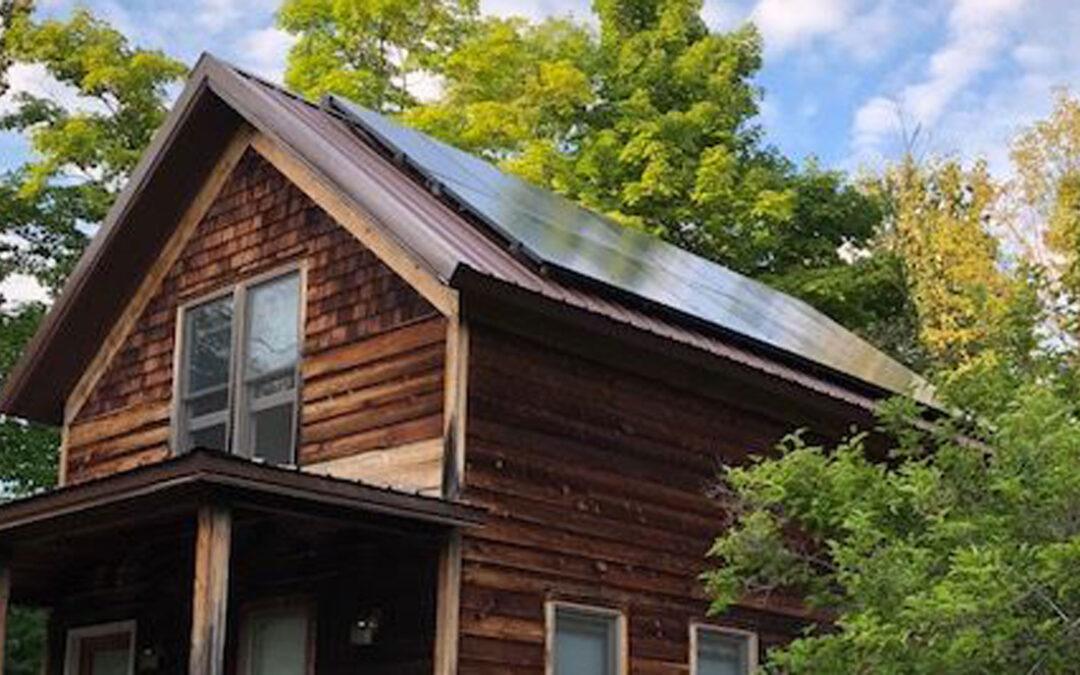
by Andrew Kell | Jul 28, 2021 | Focus on Energy, Policy, PSC Priorities, Public Service Commission
On June 29, 2021, RENEW Wisconsin hosted a webinar titled “Focus on Energy: Economic Impact in Wisconsin.” Dan York from American Council for an Energy Efficient Economy (ACEEE), Scott Blankman from Clean Wisconsin, and Maddie Wazowicz from Midwest Energy Efficiency Alliance (MEEA) provided an overview of the Focus on Energy program. In particular, Wazowicz provided pre-publication results of an upcoming Synapse Energy Economics report analyzing utility bill savings and associated efficiency of business and utility operations that would result from an increase in Focus on Energy’s annual funding.
In his introductory remarks, ACEEE’s York noted that “An analysis conducted a few years ago by the Lawrence Berkeley National Lab found that Focus on Energy was the most cost-effective program serving utility customers in the U.S.” Dan went on to say that according to ACEEE’s own state efficiency scorecard analysis, “while other states have increased their investments and associated spending for customer energy efficiency programs, such funding in Wisconsin has been largely static, locked in by the legislation that created Focus on Energy.” MEEA’s Wazowicz compared Midwestern states’ energy efficiency investments and discussed what an increase of the Focus on Energy budget could mean for Wisconsin.
To understand what additional benefits could be realized from expanding the Focus on Energy program, we can look at results from the upcoming Synapse report. The figure below uses information from a slide presented by Maddie Wazowicz at the webinar and represents pre-publication results from the Synapse study. It shows that doubling the Focus on Energy budget would translate to $20.7 million in annual utility bill savings for Wisconsin utility customers. Of that, $16.95 million in yearly utility bill savings would be realized by Wisconsin businesses if the Focus on Energy budget were doubled! This is what Wisconsin customers would save on top of savings occurring at current Focus on Energy investment levels.
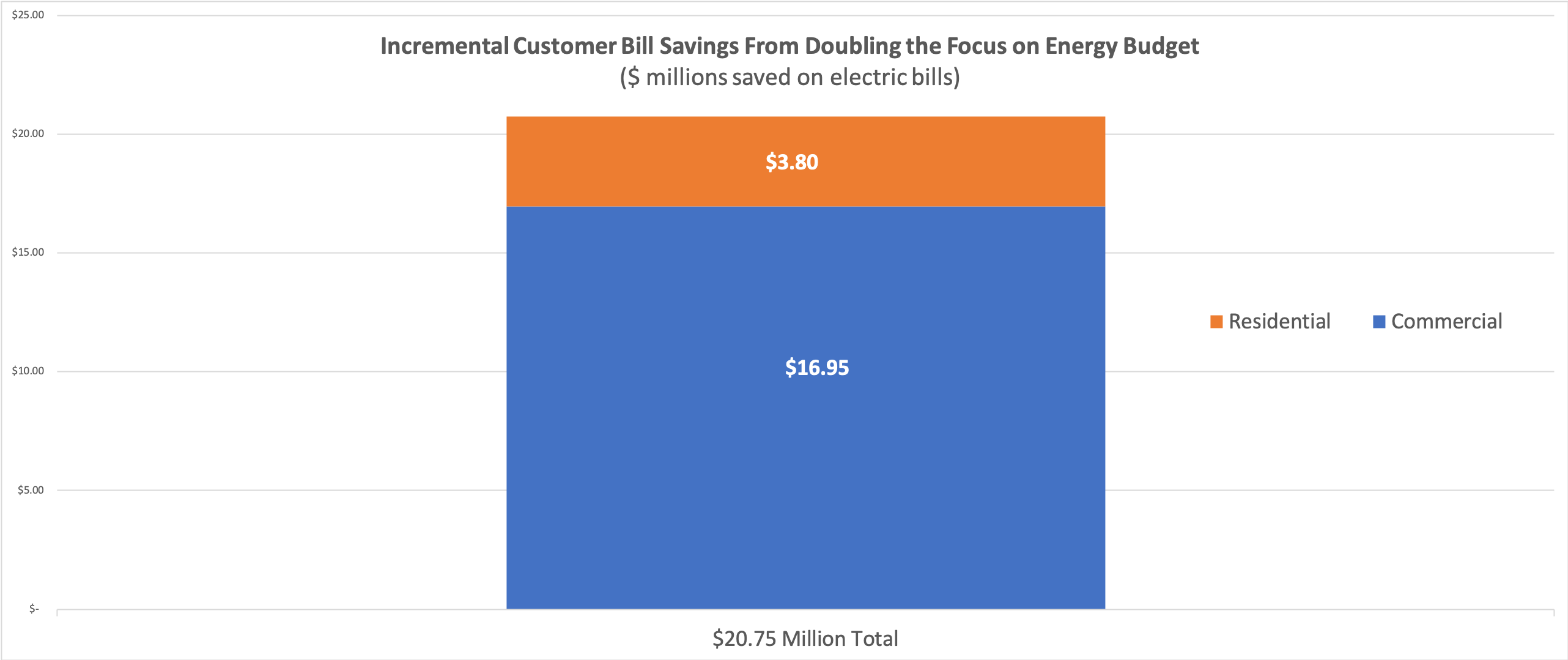
The August Synapse report details avoided utility costs, job creation, economic investment, and reduced air emissions associated with an increase in the Focus on Energy budget. Overall, the report finds that if Wisconsin doubled the Focus on Energy budget the state would receive $340 million dollars in net benefits over one year or $3.4 billion over ten years. Investing in Focus on Energy means a more clean and efficient Wisconsin economy for everyone!
The webinar then transitioned to a discussion of direct economic impacts for Wisconsin business. York moderated a panel of Wisconsin business representatives, who described their experience with the program’s energy efficiency and renewable energy incentives. The panel included Sean Hyland from American Family Insurance, Charles McGinnis from Johnson Controls, Benjamin Reynolds from Reynolds Transfer and Storage, and Tim Ulrich from Cree Lighting.
One of the hot topics of the business panel’s discussion related to data management combined with energy efficiency measures and occupancy sensors. Johnson Control’s McGinnis said that the objective of these combined technologies is to “reduce the amount of energy consumption, for the appropriate amount of occupancy, so that you can optimize the size of renewable energy application to produce green electricity.” Panelists discussed their experience with sustainability programs and performance-based metrics. In combination with his experience with the Focus on Energy program, Benjamin Reynolds described his experience with the Wisconsin Sustainable Business Council and its Green Masters Program. According to Reynolds, the Green Masters Program “is aimed at helping small-to-medium-sized businesses implement sustainability, and figure out ways to improve in energy efficiency, but also improve in waste and other performance metrics.”
Focus on Energy Impact in Wisconsin
This webinar was prompted by calls by supporters to increase funding for Focus on Energy. A RENEW blog post, penned by Michael Vickerman in October of 2020, detailed success stories and energy savings benefits realized by several Wisconsin breweries, such as Capital Brewery in Middleton, WI. That blog post referenced findings of numerous third-party evaluator annual reports on the program. These reports have found that for every dollar invested in Focus on Energy, Wisconsin receives $4 to $5 in economic and environmental benefits. That cost-to-benefit ratio represents a considerable success, as well as a huge opportunity for expansion!
The RENEW blog post also highlighted a recent review of the program by Chair Rebecca Valcq of the Public Service Commission and her request that Governor Evers propose doubling the Focus on Energy budget. Chair Valcq also recently published an op-ed in WISPOLITICS, an online journal, highlighting the economic benefits of Focus on Energy and why an increased investment is needed.
Focus on Energy is currently funded by utilities at about $95 million per year, and funding level changes can only be done through legislation. The Governor followed up on calls to increase Focus on Energy funding by doing just that with his proposed 2021-2023 budget, which RENEW highlighted in a blog post about public listening sessions earlier this year.
This past spring, legislators decided to omit all Governor Evers’ clean energy provisions from its own proposed budget, which unfortunately meant leaving an important economic growth opportunity on the cutting room floor after Governor Evers signed the state budget earlier this July.
Since its inception in 1999, Focus on Energy has fueled a more energy-efficient economy in Wisconsin. The program was created with bipartisan support and can help grow the economy once again with increased funding. Since doubling the Focus on Energy funding was not part of the state budget this year, legislators on both sides of the aisle can prioritize supporting a stand-alone piece of legislation. A clean, growing economy should be something we can all get behind!
For more information, contact Andrew Kell, RENEW Wisconsin’s Policy Analyst, andrew@renewwisconsin.org.
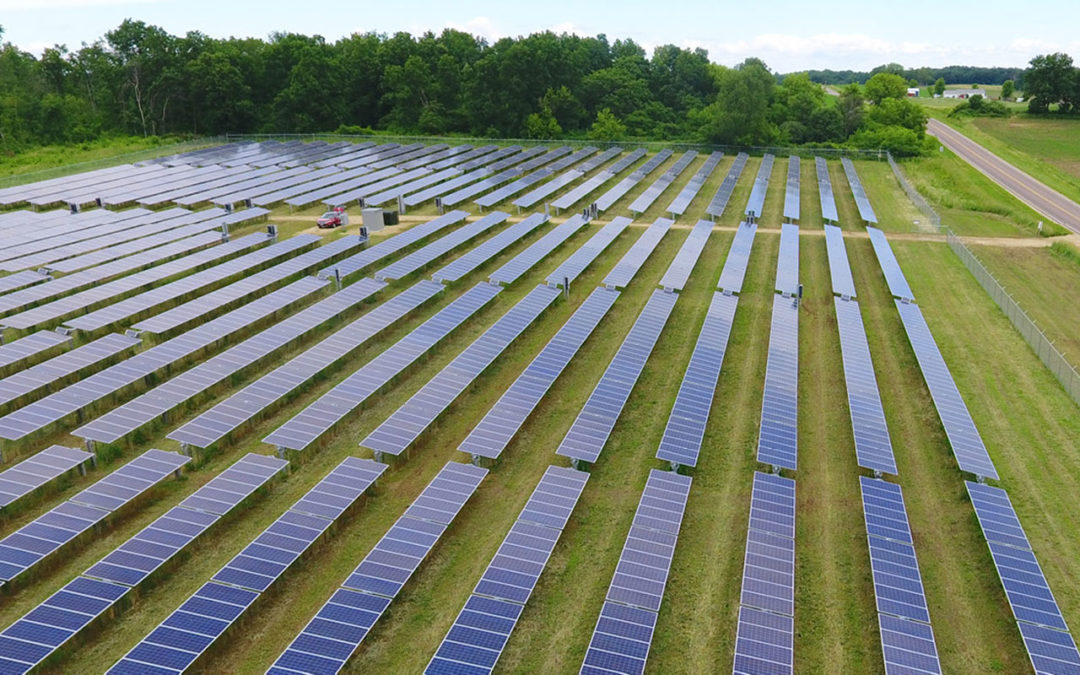
by Katelynn Samuelsen | Jul 23, 2021 | Advocacy, Community, Community Solar, Legislative Watchlist, Policy, Renewables, Solar, Utilities
This blog is from 2021 and does not reflect the 2023 iteration of the Community Solar Bill. For information on the current iteration check here.
Over the past few months, RENEW Wisconsin and our partners have been developing statewide policies that would expand customer access to community solar projects. The National Renewable Energy Laboratory defines community solar, also known as shared solar or solar gardens, as a distributed solar energy deployment model that allows customers to buy or lease part of a larger, offsite shared solar photovoltaic (PV) system. Community members subscribing to a solar facility receive credits for their share of the power produced, either in electricity bill savings or energy (kWh) credits.
New community solar projects are being rapidly developed around the country; 21 states, including Minnesota and Illinois, have already enacted policies that expand the community solar market between subscribing organizations and participating customers. Community solar deployment in the United States has achieved a five-year annual growth rate of 53%[1]. But, lacking statewide policies to promote community solar options, Wisconsin is quickly falling behind.
Since 2010, the number of solar energy systems purchased by US homeowners and businesses has grown tenfold. By the end of 2019, nearly two million homeowners and businesses were reaping the rewards from producing solar-generated electricity. Solar power is popular with many US consumers, and it has become an affordable option for many households and businesses. Yet access to solar power is limited. More than 50% of Wisconsin households cannot access solar energy onsite because they rent, live in multi-tenant buildings, have roofs that cannot host a solar system, or experience some other constraining factor.
In Wisconsin right now, only regulated utilities and cooperatives can provide energy from solar gardens to customers. A few utilities, like Madison Gas and Electric, offer a shared solar service that customers can enroll in today. However, most Wisconsin utilities do not currently have a comparable program available for their customers. That lack of access will persist unless state lawmakers adopt a modernized policy to promote a robust community solar marketplace.
Senator Duey Stroebel (R – Saukville) and Representative Timothy Ramthun (R – Campbellsport) have introduced legislation that would expand access to community solar in Wisconsin. This legislation enables the development of more community solar and supports energy freedom, expands customer choice, saves money on your utility bill, all while creating healthier and more resilient communities.
With a stronger statewide community solar policy, we would open the door for homeowners, businesses, schools, churches, and nonprofits to supply themselves with clean, affordable electricity from a local solar array.
Community solar legislation would benefit all utility customers by adding locally generated electricity to our energy grid while strengthening the rural economy at the same time. Community solar brings guaranteed savings for every subscriber as well as predictable and stable long-term energy costs. It gives customers a choice to support local clean energy projects while expanding access to affordable renewable energy for low-to middle-income residents.
Community solar expansion would allow more Wisconsin farmers to lease their land to host solar arrays and receive a guaranteed secure income for 25 years or longer. This drought-resistant cash crop is especially valuable for Wisconsin’s agricultural communities facing economic stress.
The soil underneath the panels can be planted with a variety of native plants and perennials. In addition to minimizing agricultural runoff and fixing nutrients in the soil, these perennials create a high-quality habitat for bees, butterflies, and other insects that move pollen in and around the fields and improve farm productivity.
When solar panels have reached the end of their useful lives, the equipment can be removed, and crop production can resume on the land that has become more fertile as a result of the native plantings.
A robust community solar market in Wisconsin will create thousands of jobs, spur hundreds of millions of dollars in economic growth, and save customers millions in utility bills. Community solar is proven to support economic development, expand consumer choice and bring clean energy to urban and rural communities across Wisconsin.
Learn more about the proposed community solar legislation at www.wisolarcoalition.com.
[1] The Vision of US Community Solar: A Roadmap to 2030

by Michael Vickerman | Jul 19, 2021 | Biogas, Policy, Programs, Renewables, Solar, Utilities, Wind
Wisconsin electric providers added significantly more renewable energy content to their electricity supplies in 2020 relative to 2019, according to a July 2021 report issued by the Public Service Commission. The annual report documents the amount of renewable electricity sold in Wisconsin and determines whether electric providers here comply with the State’s 15-year-old Renewable Portfolio Standard (RPS). This year’s report can be accessed from the PSC’s website at Docket No. 5-RF-2020.
Overall, RPS-eligible renewable energy (or renewable energy that supplies all utility customers) accounted for 12.98% of Wisconsin electricity sales in 2020, increasing more than two percentage points from the 10.71% level recorded in 2019.
This was the most significant advance since 2013 when the State’s electric providers achieved full compliance with the RPS statewide goal of 10% renewable electricity.
As shown in the chart below, the jump in Wisconsin’s renewable energy percentage resulted from a combination of increased renewable electricity supplies and a reduction in electricity sales caused primarily by the coronavirus pandemic.
In late 2020, Wisconsin utilities placed two significant renewable electricity sources in service: the Two Creeks solar farm near the Point Beach Nuclear Plant and the Kossuth wind power plant in north-central Iowa.
| Project |
Resource |
Capacity
(in MW) |
Location |
Utility owner(s) |
| Two Creeks |
Solar |
150 |
Manitowoc County (WI) |
WPS, MGE |
| Kossuth |
Wind |
150 |
Kossuth County (IA) |
Alliant-WPL |
More wind generation imported
Wind power now accounts for 71% of the renewable electricity sold in Wisconsin, and approximately 75% of Wisconsin’s wind generation originates from out of state. Overall, out-of-state sources produced 60% of Wisconsin’s RPS-eligible electricity in 2020.
While Wisconsin-based solar power is growing, it still represents a small sliver of the renewable energy pie. However, by the end of 2022, in-state solar generating capacity should surpass in-state wind capacity, as the ongoing utility effort to replace older fossil plants with new renewable generation shifts into high gear.
The pattern of adding in-state solar and out-of-state wind continues to unfold this year. Wisconsin utilities will have energized two solar farms by year’s end: the 150 MW Badger Hollow 1 project in Iowa County and the 100 MW Point Beach installation, adjoining Two Creeks. In January, a South Dakota wind farm called Tatanka Ridge began generating electricity. Dairyland Power Cooperative purchases electricity from a 51 MW share of that project.
Uneven distribution of renewable content
As shown in the table below, the distribution of RPS-eligible electricity varies widely from one electric provider to another. For example, Xcel Energy, whose territory covers much of Minnesota as well as western Wisconsin, has greatly expanded its renewable energy portfolio over the last three years, relying principally on wind power located west of the Mississippi River. As of today, one-third of Xcel’s electricity supply is renewably powered.
At the other end of the spectrum, the two WEC Energy utilities—Wisconsin Public Service (WPS) and Wisconsin Electric Power (We Energies)—remain stuck in the 5-7% range. That said, RENEW expects WPS’s renewable energy percentage to move higher in 2021, lifted by a full year of production from Two Creeks and five months of production from Badger Hollow 1.
The role of Wisconsin’s RPS – then and now
Today’s electric power industry is in a much different place than where it was in 2006 when the current RPS was adopted. Back then, renewable electricity was in its infancy, both in terms of cost and engineering performance. The purpose of an RPS, as conceived by clean energy advocates and sympathetic legislators, was to was kick-start utility deployment of renewable power sources, aimed at advancing several public policy objectives, among them resource diversity and cleaner air. Upwards of 10 wind power projects presently operating in Wisconsin and the region owe their existence to the RPS.
However, the RPS’s days as a mechanism for fueling new renewable power generation are long past. This year’s crop of solar farms and other renewable projects are the products of market forces and individual utility decarbonization plans, not the RPS. But it remains valuable as a publicly accessible information portal for tracking renewable power supplies flowing through the utilities’ bloodstream. Until the day the state legislature establishes a program for reducing carbon emissions economywide, complete with new metrics and indicators, we will continue to rely on these annual reports to find out how much progress Wisconsin electricity providers are making in their quest to decarbonize their power plants.

by Jim Boullion | Jul 15, 2021 | Advocacy, Community Solar, Electric Vehicles, Legislative Watchlist, Policy, Renewables, Solar, Utilities
When Governor Tony Evers introduced his 2021-23 Budget Bill in February, it included 28 provisions to advance clean energy and energy efficiency in Wisconsin. Among those provisions were recommendations to expand Focus on Energy, invest in the clean energy workforce, and support Wisconsin’s electric vehicle infrastructure.
Unfortunately, by the time the Governor signed the Budget on Thursday, July 8th, those 28 provisions, along with a majority of the Governor’s other initiatives, were removed from the Budget document adopted by the Joint Finance Committee (JFC) and legislature.
A number of the provisions and other clean energy bills may still be considered during the remainder of the upcoming regular legislative session. Among the proposals we expect to be considered include:
- Community Solar Expansion – Authorize the development of non-utility-owned community solar projects. Would direct the PSC to establish fair credit rates for subscribers and compensation to utilities for the use of their infrastructure and billing services. (Introduced for co-sponsorship on July 14th)
- 3rd Party Financing – Affirm 3rd party financing of solar arrays is legal.
- Direct Purchase of Automobiles – Enable electric vehicle manufacturers to sell vehicles directly to consumers in Wisconsin, either online or at manufacturer-owned facilities, without going through an independent dealership.
- EV Charging Station Grants – Allocate up to $10 million of the unspent VW Settlement funds for clean energy corridor incentives for EV charging stations.
- EV Charging Fees – Clarify selling electricity by the kilowatt-hour to EVs does not subject EV charging station owners to utility regulation.
RENEW Wisconsin will continue to work with the legislature and the Governor to advance these and other clean energy initiatives. We hope you will join us.
If you would like to talk to your legislators about any of these provisions or have other clean energy ideas that you think the State should adopt, click here to find your representatives’ contact information.
If you have any questions or comments about any of these issues, please contact Jim Boullion, RENEW Wisconsin’s Director of Government Affairs, at jim@renewwisconsin.org.

by Jeremy Orr | Jul 15, 2021 | Energy Storage, Microgrids, Solar
RENEW Wisconsin friends, don’t miss out!
The Wisconsin Office of Energy Innovation is currently accepting Requests for Proposals (RFPs) for the Critical Infrastructure Microgrid and Community Resilience Center Pilot Grant Program.
The Pilot seeks proposals that focus on innovative pre-disaster mitigation strategies through critical infrastructure microgrids and other resiliency projects, including the feasibility of distributed energy resources, storage, and grid-interactive schema.
Eligible applicants consist of Municipalities, Universities, Schools, Hospitals, and Like Entities (MUSH Market), and the Public Service Commission (PSC) has allocated up to $985,000 for the Pilot round of funding.
Applications are due Friday, August 6, 2021, by noon Central. Note that interested parties must create an Electronic Records Filing (ERF) account to submit materials. More information on how to create an ERF account can be found here.
For more information regarding the grant program, including eligible applicants and activities, please see the Critical Infrastructure Microgrid & Community Resilience Center Pilot Grant Application Instructions.
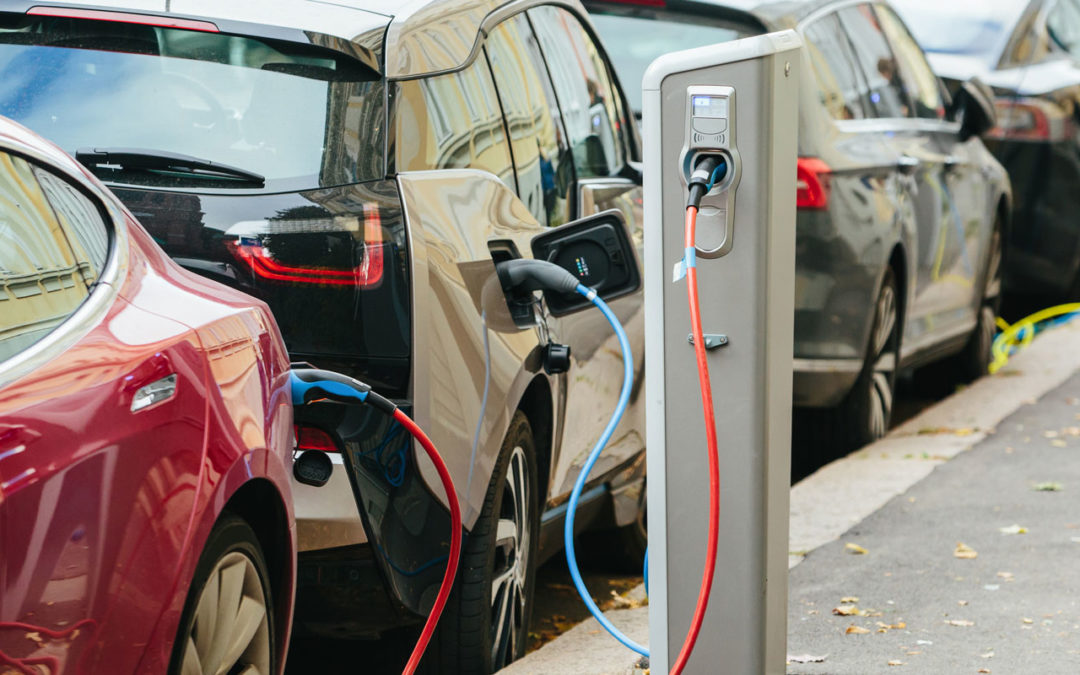
by Jeremy Orr | Jun 24, 2021 | Electric Vehicles, Energy Storage
Further demonstrating its commitment to electric vehicle innovation, including domestic battery supply chain, energy storage, and electric vehicle grid integration, the Department of Energy (DoE) announced last week a Request for Information (RFI) for Electric Vehicle (EV) Grid Integration and $200 million in funding for electric vehicles, batteries, and connected vehicles projects at DoE national labs.
Complimenting the Vehicle Technologies Office’s $62 million in funding for low emissions transportation projects, the $200 million funding opportunity focuses on electric and connected vehicle projects, and supports battery sourcing innovations – like sustainable mining and battery recycling – which strengthen the domestic lithium battery market, insulate against foreign battery supply chain disruptions, and further the goals of the DoE’s Energy Storage Grand Challenge. The funding is open to DOE’s network of 17 national laboratories and followed recommendations from the Federal Consortium for Advanced Batteries’ recently released National Blueprint for Lithium Batteries 2021-2030.
The DoE also released an RFI for EV Grid Integration, exploring the relationship between increased EV penetration and potential grid impacts and resiliency. DoE is requesting information from stakeholders on the following issues:
- Use of EVs to maintain the reliability of the electric grid
- Impact of grid integration on EVs
- Increased penetration of EVs and associated impacts on grid
- Standards to integrate EVs with the grid, including communications systems, protocols, and charging stations
- Cybersecurity challenges resulting from transportation electrification
The RFI for EV Grid Integration is not a funding opportunity. However, information collected may be used by DoE in its “Vehicles to Grid Integration Assessment Report” to Congress.
For more information on both opportunities, please visit the Office of Energy Efficiency and Renewable Energy.


